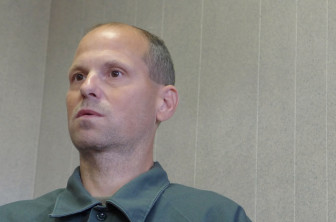Wisconsin Is National Leader on Drunken Driving Test
First state to use European test that detects heavy drinking going back months, helping target those who need treatment intervention.
Cesar is a hotel worker with five OWI convictions. He asked not to be fully identified to avoid embarrassing his employer.
At a recent interview, he said he would have his final biomarker test the next day.
He hoped it would show that he has been sober for two years. He has something to prove, not just to the judge but to his family.
“That I’m not a bad person,” he said. “So that way, I can get my driver’s license and get back to my normal life, like everybody else.”
“What this does is it reinforces the natural pride that a person would have in being sober. And it allows them to take a little more ownership of what they’re doing to stay sober,” McConeghey said.
Dane and Waukesha are testing for what are known as indirect markers.
Their program, called EDAC, is a suite of 20 routine blood tests, for instance cholesterol and liver enzymes. The results are statistically analyzed for the likelihood that a person was heavily drinking in the past month.
They are not perfect; there is a small chance that other conditions can cause the same test results. But they have an advantage: They show the damage that alcohol has done to a person’s body.
If the liver enzyme comes back high, for example, the client can learn “right away that their drinking is having an effect on their liver,” McConeghey said. “And a lot of studies show that immediate feedback about health effects of drinking have a significant effect as long as five years later on the client’s drinking.”
The fingernail and blood-spot tests used in Kenosha, Forest, Vilas and Oneida counties do not provide that kind of information. Those tests are looking for so-called direct biomarkers, which are the byproducts of alcohol itself.
Among their advantages is that they are easy to collect, requiring just a clipping.
They can be used as forensic evidence in court, because only alcohol can create their signature results. And the samples can also be used to find other drugs, as Kenosha County is doing. Wisconsin’s heroin epidemic has prompted extra interest in testing for other drugs, Bean said.
But for all the markers being used, there are costs.
Clipping nails may be easy, but finding alcohol in them requires a tall machine that costs a half a million dollars.
It is called a triple quadrupole mass spectrometer, “and it’s one of the more sensitive instruments that you can buy in the analytical chemistry world,” Lewis said.
Drivers pay about $100 for each test, and they need at least three — so many counties are hesitant to lay such costs on people who are rarely flush.
Bean is trying to get the costs down. But she says even at $300 for a three-test regimen, the tests will save counties money if they keep people out of prison.
“In one year, it’s $30,000. So you do the math. It’s 100-fold less expensive to test this person with biomarkers than to put him in jail.”

Andrew MacGillis, 42, currently at Fox Lake Correctional Institution for his seventh drunken driving offense, said he has corresponded with researcher Pamela Bean about alcohol biomarkers. Photo by Kate Golden / Wisconsin Center for Investigative Journalism.
Andrew MacGillis is serving time at Fox Lake Correctional Institution for his seventh drunken driving offense. He believes he has changed his ways — and says he would be happy to pay to prove it. He’s corresponded with Bean, who has come to visit him.
“That’s pretty cheap for an inmate to pay for that,” MacGillis said. “Yeah, I would definitely want to be in the program.”
Article Continues - Pages: 1 2
Under the Influence
-
No Treatment For Many Drunken Drivers
 Nov 16th, 2014 by Sean Kirkby
Nov 16th, 2014 by Sean Kirkby
-
Advocates Say State Not Serious About Drunken Driving
 Nov 12th, 2014 by Bill Lueders
Nov 12th, 2014 by Bill Lueders
-
Why Wisconsin Has Weak Laws on Drunken Driving
 Nov 10th, 2014 by Bill Lueders
Nov 10th, 2014 by Bill Lueders




















